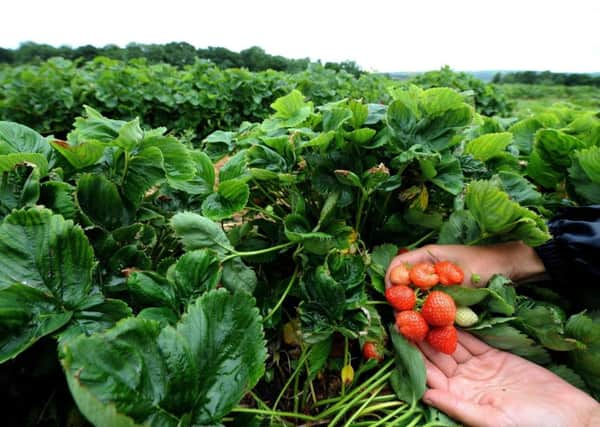Graham Richardson: Why Brexit could uproot success of Yorkshire horticultural industry


In the last 10 years, the horticultural industry has undergone a quiet staffing metamorphosis. Traditionally, our workers lived locally and their aspirations typically revolved around securing employment in the locality.
These workers have gone on to become our senior and middle managers through graft, commitment and expertise. But rural house prices have soared, and the vast majority of our nursery workers now have to travel to get to work.
Advertisement
Hide AdAdvertisement
Hide AdOur produce is acutely price-sensitive and is usually the subject of competitive tendering – a process which is infamous for suppressing price increases.
And while much of the nation reports an embargo on wage increases, our own business has witnessed 40 per cent of workers receiving a 20 per cent increase due to Living Wage stipulations, and the remaining 60 per cent gaining a minimum increase of six per cent in the last three years.
This is in addition to extra healthcare support, extra holidays, support of an ageing population through extra obligations, such as enhanced pension contributions which, while laudable, all come at a cost.
Survival has meant cost savings in every area of our expenditure – not to mention a radical overhaul of our staff profile. Our once 150-strong full-time payroll has reduced to 100, although this has happened with few redundancies.
Advertisement
Hide AdAdvertisement
Hide AdWe now supplement the balance with seasonal workers, who can react to seasonal and climatic peaks and troughs, and who are prepared to put in a full day’s manual work for a Living Wage pay cheque.
These staff are predominantly European migrants. They have a significant capacity to work and do not appear as sensitive to transient careers, which are often dominated by choice and sometimes suffer from the ‘change is as good as a rest’ mindset.
Two of our staff members, Marcin and Krzysztof, both originally from Poland, have lived in the UK for more than 15 years and have worked at Johnsons for 10.
They are now both junior managers running production centres of excellence and managing growing teams of both UK and European nationals.
Advertisement
Hide AdAdvertisement
Hide AdThey no longer see Poland as their immediate home. They are settled, motivated and proud to contribute and benefit from a vibrant UK economy. Why on earth would we send them back?
Frankly, we are not planning for a staffing ‘Doomsday’ nor a mass exodus of our European colleagues through the introduction of a ‘fortress mentality’ following exit from the European Union.
But our confidence has been shaken. Businesses and the markets don’t react well to uncertainty.
Horticulture is an ancient trade. The UK’s landscape and gardens have been adorned with shrubs, trees and plants from both national and European sources for thousands of years.
Advertisement
Hide AdAdvertisement
Hide AdIn the last 40 years, free trade has further embellished supply, allowing us to look beyond the constraints of the UK’s often unforgiving climate, to capitalise on the colour, texture and form of thousands of plant variants from rich production centres in Holland, Belgium and Italy.
But Brexit, and the prospect of trade tariffs, could undo this overnight and also significantly limit the buying options for the general public.
In isolation, and irrespective of climate change, the UK has neither the consistency of climate or sufficiently evolved production centres to provide a viable alternative. And because of a lead time governed by nature, production is speculative at best, while a massive increase in home production inevitably means unacceptable exposure.
But I refuse to consider the impact of a so-called ‘Hard Brexit’. Sometimes the prospect of the worst-case scenario is so horrendous that you are compelled to keep your face to the sunshine to obscure the shadows.
Advertisement
Hide AdAdvertisement
Hide AdThis is one of those rare occasions where I, for one, am burying my head in European sand – albeit while keeping my fingers crossed that that common sense will prevail, and that a balanced Brexit will deliver further prosperity to Yorkshire’s business community.
Graham Richardson is director of Johnsons of Whixley, based in North Yorkshire. They’re one of the largest horticultural suppliers to the commercial sector in Europe.